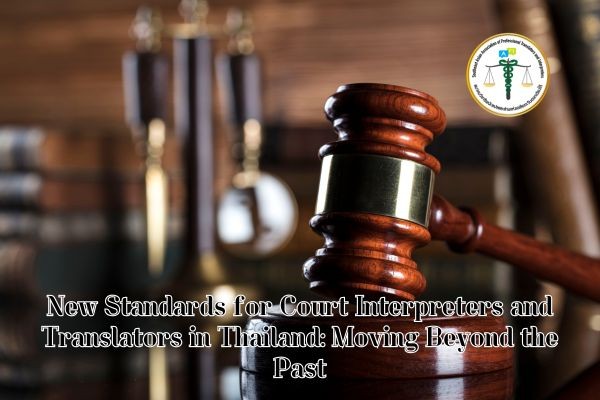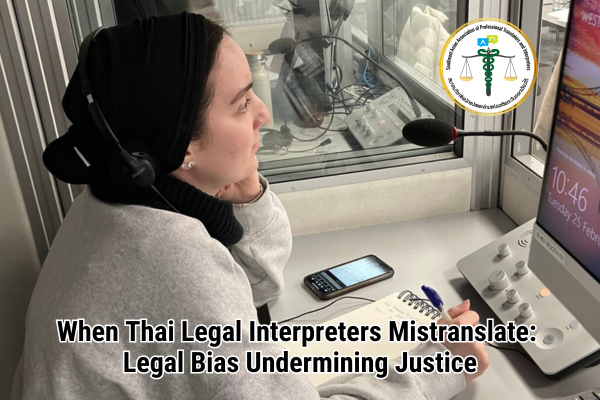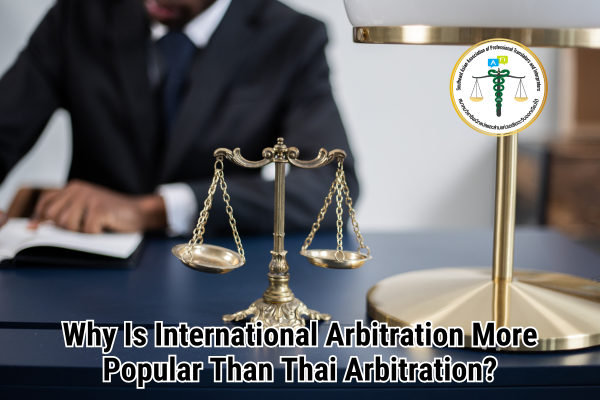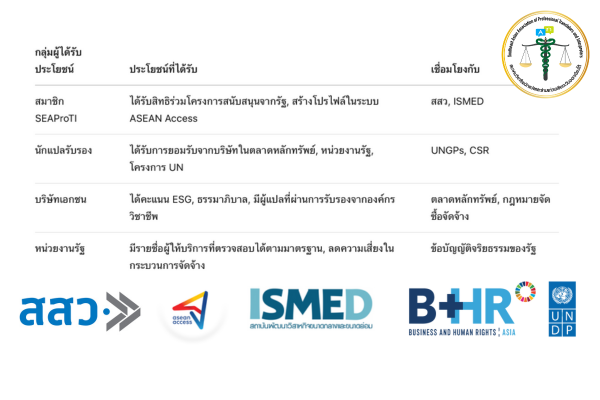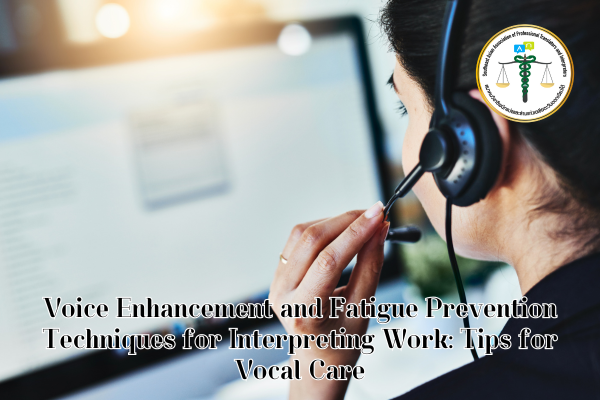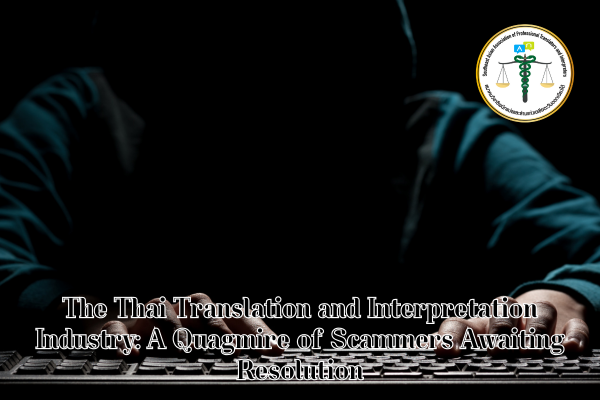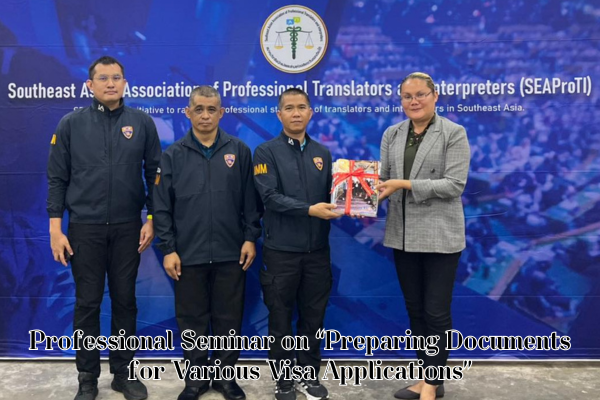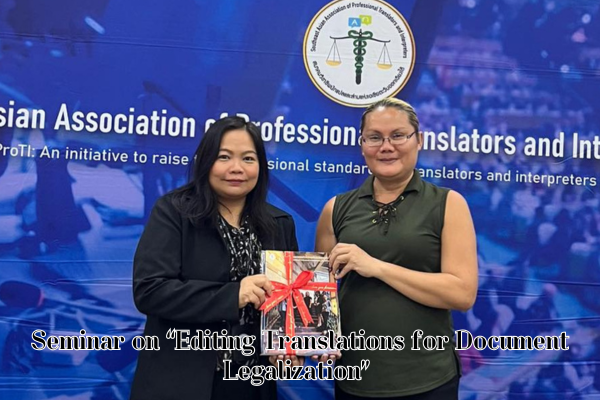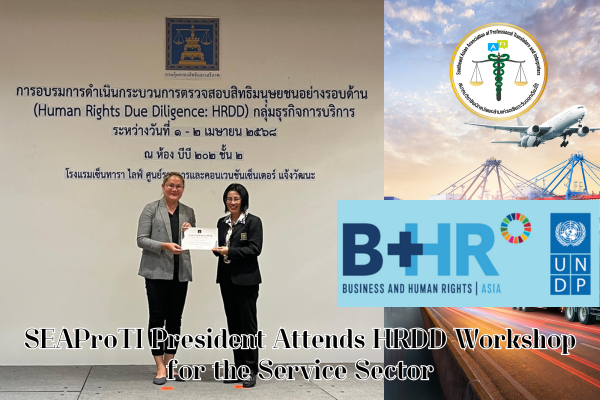New Standards for Court Interpreters and Translators in Thailand: Moving Beyond the Past
Elevating the Justice Process Through Language Access
In an era where human rights and transparency form the core values of the justice system, the roles of court interpreters and legal translators must evolve beyond outdated practices that lack clarity, accountability, and fairness. The Southeast Asian Association of Professional Translators and Interpreters (SEAProTI) has introduced a modern, ethical, and professional standard of practice—one that strengthens the integrity of legal proceedings and protects the rights of all parties involved.
From Summarizing to Complete and Accurate Interpretation
Traditional court interpreting practices in Thailand often involve summarizing, paraphrasing, or selectively interpreting only what the interpreter deems “important.” While these shortcuts may seem time-efficient, they distort the speaker’s original intent and deny the listener access to full information. Such practices violate fundamental human rights, particularly Article 14 of the International Covenant on Civil and Political Rights (ICCPR), which guarantees the right to a fair trial and the right to understand charges clearly.
SEAProTI-certified interpreters are required to render every utterance in the courtroom fully and accurately, without omissions, additions, or alterations. This ensures that all parties—defendants, attorneys, and judges—receive and understand the same information equally and fairly.
Translating Legal Documents: Clarity That Can Impact Lives
Legal document translation is not merely a linguistic task—it requires legal literacy and a high degree of responsibility. SEAProTI emphasizes that translations must be done by qualified professionals who can demonstrate their expertise and who personally certify the accuracy of their work. It is unacceptable for a translator, lawyer, or any third party to create a summary translation and have a client sign off on it without full comprehension. Misunderstandings caused by poor or inaccurate translations can lead to unjust outcomes and violations of due process.
Separating Roles to Avoid Conflicts of Interest
One of the most problematic practices in legacy interpreting is allowing the same individual to both translate case documents and serve as the courtroom interpreter for the same case. This creates a serious conflict of interest, as the translator becomes both the producer of written evidence and the voice delivering live oral interpretation in court.
Professional standards set by international associations such as AIIC, NAJIT, and SEAProTI clearly state that interpreters must refrain from accepting assignments in cases where they have had any other involvement, such as having translated documents. This separation ensures impartiality, independence, and transparency throughout the proceedings.
Transparency and Verifiability: The Pillars of Justice
All translated materials submitted in court must be subject to verification by both parties. A neutral third party should be responsible for submitting translated documents to the court to eliminate bias. When the translator is also the court interpreter, the lack of independent oversight makes it impossible to scrutinize the intent and accuracy of the translation—compromising the transparency of the judicial process.
If the public discovers that the same person translated and interpreted for a case, it may raise doubts about impartiality and fairness. Such perceptions can severely damage public confidence in the Thai justice system, both domestically and internationally.
SEAProTI’s Ethical Enforcement and Professional Accountability
SEAProTI has implemented strict measures to uphold professional standards and restore trust in the justice system. All members must adhere to internationally recognized standards. Any SEAProTI-affiliated translator or interpreter found to summarize, omit, or misinterpret—especially those who take on dual roles in the same case—will have their certification and membership permanently revoked.
SEAProTI’s approach aligns with the United Nations Guiding Principles on Business and Human Rights (UNGPs), which emphasize transparency, merit-based certification, accountability, fairness, and social responsibility. Practitioners must be vetted through a clear and transparent selection process and hold internationally recognized credentials.
Abandoning Old Practices: A Long-Term Investment in Justice
Although outdated methods such as summarizing or dual-role assignments may seem cost-effective in the short term, they carry serious long-term risks—including wrongful convictions, loss of public trust, and violations of international human rights standards. Adopting modern, ethical practices is not only a professional imperative but also a long-term investment in the integrity of the legal system.
Conclusion: Modern Interpreters and Translators Must Be More Than Multilingual
The role of court interpreters and translators extends far beyond speaking multiple languages. These professionals are essential to delivering fair, accurate, and equitable access to justice. Precision is not enough—ethics, neutrality, and professional accountability are equally critical.
It is time for Thailand to leave behind outdated practices and embrace global standards for court interpretation and legal translation. Only by doing so can we build a justice system that is fair, transparent, and worthy of public trust—one that protects the rights of every individual, regardless of the language they speak.
SEAProTI’s certified translators, translation certification providers, and certified interpreters:
The Southeast Asian Association of Professional Translators and Interpreters (SEAProTI) has officially announced the criteria and qualifications for individuals to register as “Certified Translators,” “Translation Certification Providers,” and “Certified Interpreters” under the association’s regulations. These guidelines are detailed in Sections 9 and 10 of the Royal Thai Government Gazette, issued by the Secretariat of the Cabinet under the Office of the Prime Minister of the Kingdom of Thailand, dated July 25, 2024, Volume 141, Part 66 Ng, Page 100.
To read the full publication, visit: the Royal Thai Government Gazette
แนวทางใหม่ของนักแปลและล่ามในห้องพิจารณาคดี: จากอดีตสู่มาตรฐานสากล
ยกระดับกระบวนการยุติธรรมผ่านการสื่อสาร:
ในยุคที่สิทธิมนุษยชนและความโปร่งใสกลายเป็นหัวใจสำคัญของดระบวนการยุติธรรม การทำหน้าที่ของนักแปลและล่ามในห้องพิจารณาคดีจึงไม่สามารถยึดถือแนวทางแบบเก่าที่ขาดความชัดเจน และตรวจสอบไม่ได้อีกต่อไป สมาคมวิชาชีพนักแปลและล่ามแห่งเอเชียตะวันออกเฉียงใต้ (SEAProTI) ได้กำหนดแนวทางวิชาชีพใหม่ที่เน้นคุณธรรม จริยธรรม และความเป็นมืออาชีพ เพื่อเสริมสร้างความยุติธรรมให้เกิดขึ้นจริงในทุกกระบวนการพิจารณาคดี
การแปลในห้องพิจารณาคดี: จากการสรุปสู่การถ่ายทอดครบถ้วน
แนวทางแบบเดิมที่มักพบในการล่ามในศาล คือการแปลแบบตัดตอน เลือกเฉพาะส่วนสำคัญ หรือแปลแบบสรุป ซึ่งอาจดูเหมือนช่วยประหยัดเวลา แต่กลับเป็นการบิดเบือนเจตนารมณ์ของผู้พูด ทำให้ผู้ฟังไม่ได้รับข้อมูลครบถ้วน และขัดต่อหลักสิทธิมนุษยชน โดยเฉพาะข้อ 14 ของกติการะหว่างประเทศว่าด้วยสิทธิพลเมืองและสิทธิทางการเมือง (ICCPR) ที่รับรองสิทธิในการพิจารณาคดีอย่างเท่าเทียมและเข้าใจข้อกล่าวหาอย่างชัดเจน
ล่ามยุคใหม่ภายใต้การรับรองของ SEAProTI ต้องถ่ายทอดทุกถ้อยคำในห้องพิจารณาคดีอย่างครบถ้วน ไม่ตัด ไม่สรุป และไม่เพิ่มเติมข้อความ เพื่อให้มั่นใจว่าทุกฝ่ายเข้าใจสถานการณ์ได้อย่างถูกต้องและเท่าเทียม
การแปลเอกสารประกอบคดี: ความชัดเจนที่มีผลต่อชีวิต
การแปลเอกสารสำคัญทางคดีต้องอาศัยความเข้าใจอย่างลึกซึ้ง นักแปลต้องมีคุณสมบัติที่พิสูจน์ได้ว่าเชี่ยวชาญ และต้องเป็นผู้รับรองคำแปลด้วยตนเอง ไม่ควรให้นักแปล ทนาย หรือบุคคลอื่นแปลแบบสรุปแล้วให้ลูกความลงนามรับรอง เพราะหากเกิดความผิดพลาด ลูกความจะต้องรับผิดชอบอย่างไม่ยุติธรรม การแปลทุกคำจึงต้องเป็นไปโดยความเข้าใจและความรับผิดชอบของนักแปลผู้ทำหน้าที่นั้นจริง ๆ
การแยกบทบาท: ป้องกันผลประโยชน์ทับซ้อน
การที่นักแปลทำหน้าที่แปลเอกสารและเป็นล่ามในคดีเดียวกัน เป็นการละเมิดหลักความเป็นกลางและความน่าเชื่อถือ โดยเฉพาะเมื่อเอกสารที่แปลได้นำมาใช้เป็นหลักฐาน นักแปลในฐานะผู้ผลิตข้อมูลจึงไม่ควรเป็นผู้ถ่ายทอดคำพูดในศาลอีก เพื่อป้องกันผลประโยชน์ทับซ้อนและรักษาความยุติธรรม
องค์กรวิชาชีพระดับโลก เช่น AIIC, NAJIT และ SEAProTI ต่างยืนยันหลักการเดียวกันว่า นักแปลและล่ามไม่ควรปฏิบัติหน้าที่ซ้อนกันในคดีเดียวกัน เพื่อคงไว้ซึ่งความเป็นอิสระ ความโปร่งใส และความสามารถในการตรวจสอบย้อนหลัง
ความโปร่งใสและการตรวจสอบได้: หัวใจของกระบวนการยุติธรรม
ทุกเอกสารที่แปลต้องสามารถตรวจสอบได้โดยคู่ความทั้งสองฝ่าย และควรมีบุคคลกลางเป็นผู้ส่งเอกสารต่อศาล การไม่มีผู้ตรวจสอบภายนอกจะทำให้ไม่สามารถยืนยันเจตนาของคำแปลได้ ซึ่งขัดต่อหลักความโปร่งใสและความน่าเชื่อถือในกระบวนการยุติธรรม
หากสาธารณชนทราบว่าผู้แปลเอกสารเป็นผู้เดียวกับล่ามในคดี ความเชื่อมั่นในความโปร่งใสของกระบวนการยุติธรรมย่อมลดลง ส่งผลกระทบต่อภาพลักษณ์ของระบบยุติธรรมไทยในระดับนานาชาติอย่างหลีกเลี่ยงไม่ได้
มาตรการของ SEAProTI: ยืนหยัดในจริยธรรมและความรับผิดชอบ
สมาคม SEAProTI ได้ออกมาตรการที่เข้มงวดเพื่อยกระดับคุณภาพและความเชื่อมั่นในวิชาชีพ โดยกำหนดให้สมาชิกทุกคนต้องปฏิบัติตามแนวทางที่อิงตามมาตรฐานสากล หากตรวจพบว่ามีการฝ่าฝืน เช่น การแปลสรุป แปลคลาดเคลื่อน หรือปฏิบัติหน้าที่ซ้อนกันในคดีเดียวกัน สมาคมจะดำเนินการถอนใบอนุญาตทันที และเพิกถอนสถานภาพสมาชิกตลอดชีพ รวมถึงไม่ให้เข้าร่วมกิจกรรมใด ๆ ของสมาคมอีกต่อไป
แนวทางของ SEAProTI ยังยึดหลัก UN Guiding Principles on Business and Human Rights (UNGPs) ซึ่งให้ความสำคัญกับความโปร่งใส มาตรฐาน การตรวจสอบ ความเป็นธรรม และความรับผิดชอบต่อสังคม ผู้ประกอบวิชาชีพต้องได้รับการคัดเลือกและรับรองจากองค์กรที่เชื่อถือได้ และต้องสามารถตรวจสอบคุณสมบัติได้อย่างโปร่งใส
การละทิ้งแนวทางแบบเดิม: ลงทุนเพื่อความยุติธรรมระยะยาว
แม้การแปลแบบตัดตอนจะดูประหยัดเวลาและต้นทุนในระยะสั้น แต่กลับสร้างผลเสียร้ายแรงในระยะยาว ทั้งต่อผู้ต้องหา กระบวนการยุติธรรม และภาพลักษณ์ของประเทศ การยึดมั่นในแนวทางใหม่จึงเป็นการลงทุนเพื่อความเป็นธรรมที่ยั่งยืน
สรุป: นักแปลและล่ามในยุคใหม่ ต้องได้มากกว่าการพูดภาษาต่างประเทศได้
บทบาทของนักแปลและล่ามในศาลไม่ใช่แค่การถ่ายทอดภาษา แต่คือการเป็นกลไกสำคัญที่ช่วยให้ มีการนำเสนอข้อเท็จจริงอย่างถูกต้องและเป็นธรรม การแปลจึงต้องไม่เพียงแต่แปลให้แม่นยำ แต่ต้องยึดหลักจรรยาบรรณ ความเป็นกลาง และความรับผิดชอบ
ถึงเวลาแล้วที่ประเทศไทยจะต้องก้าวข้ามแนวทางแบบเก่า และหันมายึดแนวทางใหม่ที่ยึดถือมาตรฐานสากล โปร่งใส และตรวจสอบได้ เพื่อสร้างความยุติธรรมที่แท้จริงให้กับทุกคนในสังคม
เกี่ยวกับนักแปลรับรอง ผู้รับรองการแปล และล่ามรับรองของสมาคมวิชาชีพนักแปลและล่ามแห่งเอเชียตะวันออกเฉียงใต้
สมาคมวิชาชีพนักแปลและล่ามแห่งเอเชียตะวันออกเฉียงใต้ (SEAProTI) ได้ประกาศหลักเกณฑ์และคุณสมบัติผู้ที่ขึ้นทะเบียนเป็น “นักแปลรับรอง (Certified Translators) และผู้รับรองการแปล (Translation Certification Providers) และล่ามรับรอง (Certified Interpreters)” ของสมาคม หมวดที่ 9 และหมวดที่ 10 ในราชกิจจานุเบกษา ของสำนักเลขาธิการคณะรัฐมนตรี ในสำนักนายกรัฐมนตรี แห่งราชอาณาจักรไทย ลงวันที่ 25 ก.ค. 2567 เล่มที่ 141 ตอนที่ 66 ง หน้า 100 อ่านฉบับเต็มได้ที่: นักแปลรับรอง ผู้รับรองการแปล และล่ามรับรอง


